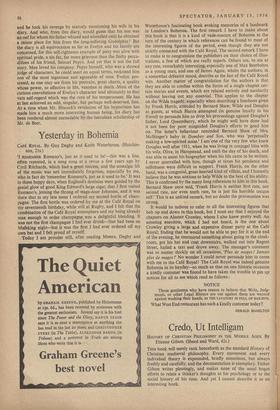Credo, Ut Intelligam
This book will surely rank henceforth as the standard History of Christian mediaeval philosophy. Every movement and every individual theory is expounded, briefly sometimes, but always freshly and carefully, and the documentation is exemplary. Father Gilson writes pleasingly, and makes none of the usual bogus efforts to relate a thinker's thoughts to his psychology or to the social history of his time. And yet 1 cannot describe it as an interesting book.
Scholasticism--:–if I may thus briskly speak of the whole of mediaeval Christian philosophy—is a boring subject. It is not boring because the met'ireval world was so little like our own; the world of classical antiquity was less like our own, and Greek philosophy is never dull. Oriental philosophy is almost too interest- ing. The reason why scholastic philosophy is boring is, I believe, that it was never an autonomous discipline. It was subordinate to theology. None of the most interesting questions in philosophy• —questions about God, Immortality, Duty and .so forth—was ever a real question for the schoolmen, because they already had
• the answers—the answers theology imposed. As philosophers there were only two things they could do : they could either work out new ways of reaching conclusions already established by theology (e.g., the rational proofs of the existence of God); or they could busy themselves with minor and often trivial problems (How many angels, etc.?) in such little spielraum as theology allowed them.
Nearly every important development in the history of scholasti- cigm was, as Father Gilson shows, produced by the influence on Christian clerks of Greek philosophical texts rediscovered at long intervals throughout the Middle Ages. But the subservience of the schoolmen to theology compelled them to concentrate on the form and not on the content of these texts. Greek speculation in the realms of ethics and metaphysics was too plainly at variance with dogmatic certainties for the sc.hoolmen to exercise their minds upon it. They were left with the refinement of logic. The dec4ine of scholasticism into the cult of the syllogism and disputation for the sake of disputation was, in the circumstances, almost inevitable.
Nor is it the least surprising that the great philosophers of the schools—Augustine, Denis, Anselm, Aquinas, Duns Scotus and Ockham—were all primarily, as Father Gilson says, theologians. Indeed, it is hard to see how they could have been great philoso- phers of their kind unless they had been great theologians. In such philosophy alone there is no scope for. greatness. The words Father Gilson uses to sum up the achievement of Aquinas seem to me to provide the key sentence to this book and to scholasticism generally. Aquinas, Father Gilson says, 'changed the water of _philosophy to the wine of theology.' Water, forsooth! The metaphor is perfect. Scholastic philosophy is usually clear; it purifies and sometimes it dilutes theology; but how quickly one has had enough of it!
MAURICE. CRANSTON



































 Previous page
Previous page